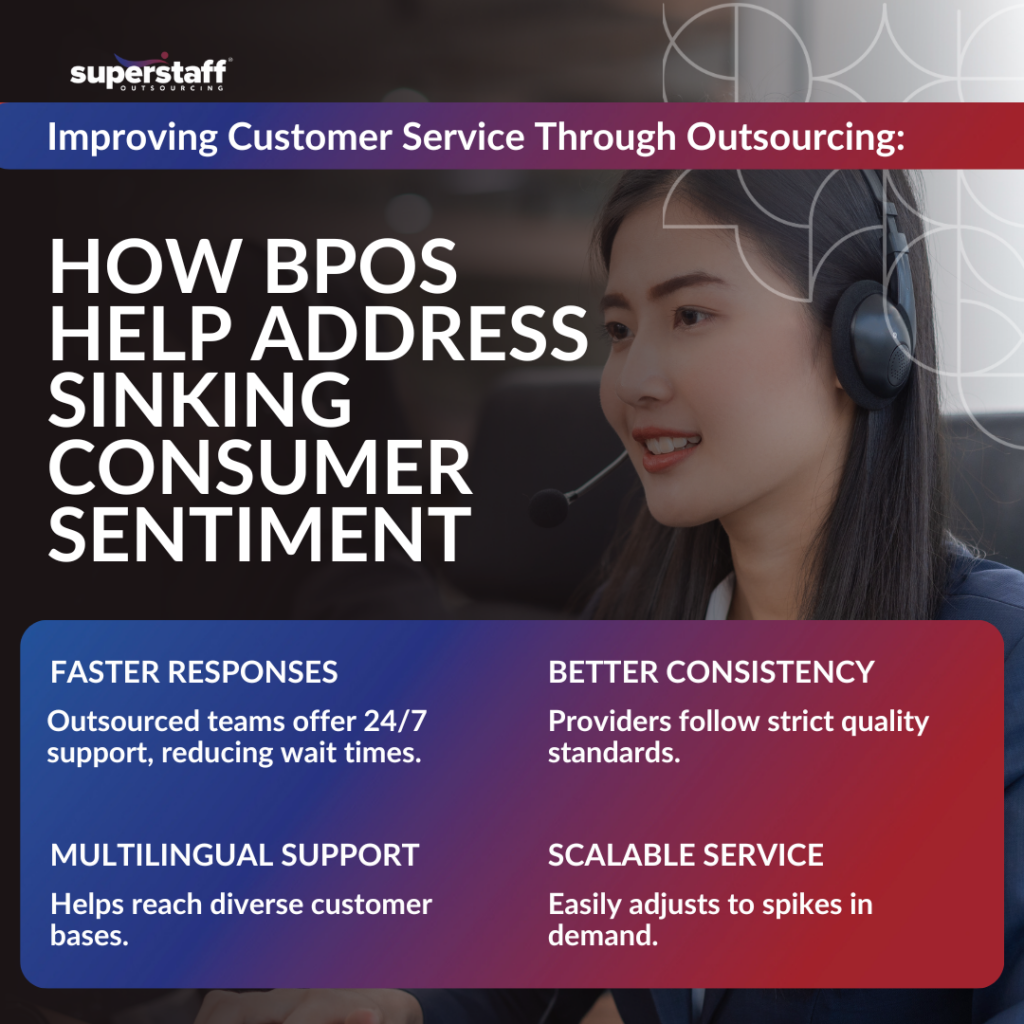
With U.S. consumer sentiment hitting alarming lows, could exceptional customer experience (CX) be the life raft businesses need?
As inflation continues to stretch household budgets and economic uncertainty erodes buyer confidence, consumers are growing more selective, more cautious, and less forgiving. Trust in brands is dwindling. Customer expectations are rising. And for businesses across all industries, the fight for loyalty is no longer just about pricing or product. It’s about how customers feel at every touchpoint.
Amid this shifting landscape, improving customer service through outsourcing has become more than a cost-cutting measure—it’s a survival strategy. By tapping into experienced offshore teams trained in empathy, responsiveness, and brand alignment, companies can elevate CX, rebuild trust, and keep customers coming back.
In this blog, we’ll explore how outsourcing customer service can directly address declining consumer sentiment and why doubling down on CX now could be the smartest move your business makes this year.
Declining Consumer Sentiment in the U.S.
Current economic pressures have led to a marked decline in consumer sentiment, impacting businesses significantly.
According to the University of Michigan’s Index of Consumer Sentiment, confidence levels have plummeted to 12% due to inflation, geopolitical unrest, and labor market uncertainty. Consumers are more cautious about where they spend and are more critical of brand experiences.
Several contributing factors include:
- Inflation: Rising prices for groceries, gas, and housing are diminishing purchasing power.
- Recession Fears: News cycles continue highlighting fears of a recession, which psychologically primes consumers to tighten budgets.
- Unstable Employment: Although unemployment rates are relatively stable, the fear of layoffs, especially in tech and finance, has made consumers more risk-averse.
Impact on spending and loyalty:
Consumers are becoming increasingly selective, cutting non-essential expenses and focusing on brands they trust. They are less tolerant of poor service; even minor negative experiences can break relationships.
Increased scrutiny of brands:
Customer service interactions are under the microscope. A single bad experience, such as a long wait time or an unhelpful agent, can lead to public complaints on social media and a permanent loss of loyalty.

Why CX Matters More in Times of Low Consumer Confidence
Exceptional customer experience becomes a decisive factor for consumer loyalty during periods of low confidence.
When consumers feel financially strained or uncertain about the future, their emotional response to brand experiences becomes magnified. Positive experiences foster trust, ease anxiety, and give customers a sense of control.
CX’s role in decision-making and advocacy:
- Great CX influences whether a customer completes a purchase, especially for high-involvement or discretionary items.
- A positive experience increases the likelihood of repeat business, turning cautious buyers into loyal ones.
- Satisfied customers often become brand advocates, recommending businesses to peers and providing valuable word-of-mouth marketing.
Customer churn after bad experiences:
- Studies show that 32% of consumers will stop doing business with a brand they love after just one bad experience.
- In a volatile market, losing a single customer can be costlier than ever, especially with reduced acquisition budgets.
CX as a competitive advantage:
As products and prices become easier to compare, CX becomes the standout factor. Brands that deliver consistent, empathetic, and efficient service rise above competitors.
Challenges Companies Face Delivering Exceptional CX
Many businesses struggle to consistently deliver exceptional CX amidst economic uncertainty.
As customer expectations continue to rise, companies find it increasingly difficult to meet service demands using internal teams alone. This challenge has become even more pronounced in light of shifting outsourcing trends in customer service, which show a growing reliance on external partners to address capability gaps.
Internal resource constraints:
With tighter budgets, many companies face hiring freezes or staff shortages. CX teams are stretched thin, leading to employee burnout, slower response times, and inconsistent service delivery—conditions that can severely damage customer satisfaction and loyalty.
Operational inefficiencies:
Legacy systems, siloed departments, and a lack of integration between communication tools prevent teams from offering a seamless and cohesive experience. Customers expect faster, smarter support, but disjointed processes often get in the way.
High expectations for personalization:
Today’s customers want more than transactional support—they expect real-time responses, tailored interactions, and agents who understand their needs. Delivering this level of personalization requires advanced technology and skilled agents, which many in-house teams struggle to provide at scale.
High operational costs:
Running an internal customer service operation involves substantial investments in staffing, training, facilities, and technology. For many businesses, this cost structure is unsustainable, especially in a volatile market.
Scalability issues:
Seasonal surges or unexpected demand spikes, such as during holidays or product launches, require flexible workforce models. In-house teams often lack the agility to scale quickly, leading to long wait times and frustrated customers.
As these pressures mount, more companies are turning to outsourcing as a strategic solution, reflecting the growing outsourcing trends in customer service that prioritize flexibility, cost-efficiency, and service excellence.
How Outsourcing Customer Service Enhances CX
Customer service outsourcing provides essential tools to dramatically enhance CX. As consumer expectations grow more complex, BPO customer service solutions have become vital for companies aiming to deliver fast, consistent, and personalized support at scale. These solutions combine industry expertise with advanced technology to elevate every aspect of the customer experience.
Access to specialized expertise:
Leading BPO providers offer access to well-trained teams skilled in customer engagement, complaint resolution, and omnichannel communication. These professionals bring industry experience, ensuring each interaction aligns with brand values and customer expectations.
Advanced technologies:
BPO customer service solutions often include cutting-edge platforms such as AI-driven chatbots, CRM systems, and real-time analytics. For many businesses, partnering with a BPO provides access to these tools without the heavy investment required to build them in-house.
Scalability on demand:
One of the most significant advantages of outsourcing is the ability to scale support operations quickly. Whether it’s a seasonal spike or an unexpected surge in inquiries, BPOs can ramp up resources without the delays or costs associated with internal hiring and training.
Consistency and reliability:
Top BPOs operate with clearly defined service level agreements (SLAs) and performance metrics, ensuring consistent quality across all customer interactions. This helps maintain high standards, regardless of call volume or customer channel.
Flexibility during market volatility:
BPO customer service solutions offer the agility to adjust operations as market conditions change. From expanding support hours to shifting communication strategies, outsourcing enables companies to remain responsive without disrupting core business functions.
Improving Customer Satisfaction Through Outsourcing
Outsourcing customer service consistently leads to stronger customer satisfaction scores, primarily when guided by the best practices for outsourcing customer service to enhance CX. Here’s how:
Faster Response and Resolution Times
With dedicated teams operating around the clock, outsourced providers minimize wait times and resolve issues more efficiently. This speed and availability drive high CSAT and NPS, helping customers feel valued and heard in every interaction.
Multilingual and Multicultural Support
Global BPOs offer multilingual capabilities that break language barriers and allow for culturally sensitive communication. This inclusivity builds trust across diverse markets and creates a more personalized, accessible experience for every customer.
Proactive Problem-Solving
Leading providers use predictive analytics and customer data to anticipate common issues. Instead of waiting for problems to escalate, they reach out proactively, reassuring customers and reinforcing brand reliability before frustrations occur.
CX Gains Through Best Practices
The most effective improvements come when businesses follow the best practices for outsourcing customer service to enhance CX. This includes aligning KPIs, maintaining open communication, investing in continuous agent training, and using feedback to fine-tune service delivery. These practices ensure your outsourced team consistently reflects your brand and elevates your customer experience at every touchpoint.
Driving Cost Efficiency Without Sacrificing CX
Outsourcing provides significant cost advantages while maintaining or improving service quality.
Reduced overhead:
Businesses can avoid the fixed costs of office space, equipment, HR administration, and full-time staff by moving customer service to a trusted provider.
More predictable expenses:
Outsourcing agreements often use fixed or volume-based pricing models, improving budget forecasting and financial planning.
Freeing up internal resources:
With support tasks handled externally, internal teams can focus on growth, strategy, and core business innovation.
Scalability without cost spikes:
During high-demand periods like Black Friday or crisis moments, outsourced teams can scale services up quickly without the spike in overtime or temporary staffing costs.
Future-Proofing Your Business with Exceptional CX
Proactive CX strategies through outsourcing equip businesses to thrive, even amid ongoing economic uncertainty.
Anticipating customer needs:
Outsourcing partners often have the scale and data to spot trends early, enabling businesses to stay ahead of customer expectations.
Building long-term loyalty:
When customers consistently receive excellent service, especially in difficult times, it builds emotional loyalty that can outlast pricing wars or competitors’ discounts.
Resilience and innovation:
Outsourcing introduces fresh ideas and new technologies, helping companies stay flexible, experiment faster, and future-proof their CX strategies.
Why Improving Customer Service Through Outsourcing Is the Key to Stronger CX and Brand Resilience
In today’s uncertain economy, customer service outsourcing is no longer optional—it’s essential. As inflation and instability chip away at consumer trust, delivering standout CX is one of the few ways businesses can regain loyalty and stay competitive.
This blog has shown how improving customer service through outsourcing leads to faster support, consistent quality, and real personalization, boosting satisfaction, loyalty, and brand perception. But to get these results, you need the right partner.
That’s where SuperStaff comes in. With global talent, multilingual support, and CX expertise, our BPO team helps brands scale, save, and shine. Ready to elevate your customer experience?
Partner with SuperStaff today and turn CX into your biggest competitive edge.






